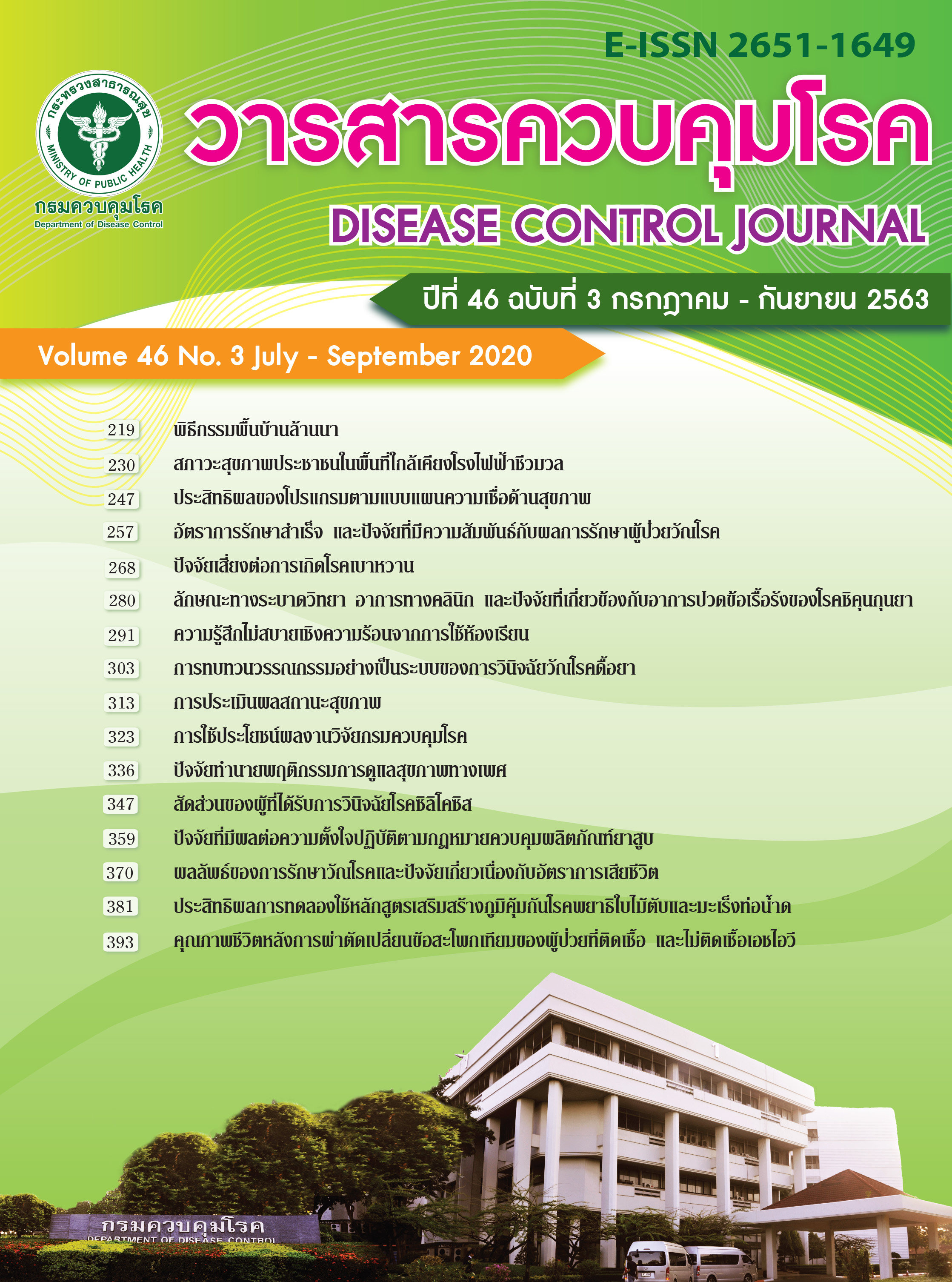Effectiveness of a program based on health belief model to reduce pesticide exposure among rice farmers in Kong Krailat District, Sukhothai Province
DOI:
https://doi.org/10.14456/dcj.2020.24Keywords:
Health belief program, Prevention behavior from pesticides, FarmersAbstract
This quasi-experimental research aimed to study the effectiveness of pesticide exposure prevention program based on the health belief model in reducing chemical exposure among rice farmers. The sample group consisted of 60 farmers who primarily produce rice in Kong Krailat District, Sukhothai Province. The samples were divided into two groups, 30 into the experimental group and 30 into the control group, using a sample group purposive selection method. The experimental group was assigned to participate in pesticide exposure prevention program. Health belief programs include activities to generate perceived susceptibility, perceived severity, perceived benefits, and perceived barriers, while reinforcing the awareness and encouraging good practices through the public address system and home visit. Data were collected using a questionnaire on perception and behavior of pesticide exposure prevention based on the health belief model among farmers. The data were analyzed by descriptive statistics, independent t-test, and paired t-test. Prior to program implementation, there was no difference in the perception of health belief and pesticide exposure prevention behaviors between the experimental group and the comparison group. Following participation in the program, the experimental group was found to have achieved statistically significantly higher mean scores with respect to the perception of health belief and pesticide exposure prevention behaviors (p<0.01). When comparing the mean scores between the experimental group and the comparison group, the former had mean scores relating to the perception of health belief and pesticide exposure prevention behaviors that are statistically significantly higher than those of the comparison group (p<0.01). The results of this study indicate that the health belief program on pesticide exposure prevention behaviors among the farmers is effective.
Downloads
References
Office of Agricultural Economics. Quantity and value of imports of agricultural hazardous substances in 2014-2018 [Internet]. [cited 2019 May 10]. Available from: http://www.oae.go.th/view/1/ปัจจัยการผลิต/TH-TH (in Thai)
Bureau of Occupational and Environmental Diseases, Department of Disease Control, Ministry of Public Health. Occupational diseases from agriculture [Internet]. [cited 2017 Oct 22]. Available from: http://envocc.ddc.moph.go.th/contents/view/404 (in Thai)
Official Statistics of Thailand. Farmers who registered in 2014-2016 [Internet]. [cited 2018 Jun 13]. Available from: http://statv2.nic.go.th/Agriculture/11010100_04.php (in Thai)
Krainai Health Promoting Hospital. Agriculture is not a disease. Sukhothai: Kongkrailat; 2015.
Krainai Health Promoting Hospital. Agriculture that does not use pesticides or chemicals does not bring any contamination.Sukhothai: Kongkrailat; 2016.
Yodchan S. Effect of health belief model on pesticide prevention behaviors among the farmers [dissertation]. Phitsanulok: Naresuan University; 2011. 158 p. (in Thai)
Sornthadet N. The effectiveness of health belief program on pesticide prevention behavior among the farmers. Disease Control Journal 2016;42:108-18.
Bernard, R. Fundamentals of biostatistics. 5th ed. Duxbery: Thomson learning; 2000.
Phongyou A. Effect of health promotion program on pesticide prevention behaviors and pesticide exposure level of maize growers, Phop Phra District, Tak Province [dissertation]. Phitsanulok: Naresuan University; 2015. 114 p. (in Thai)
Nongkratum Health Promoting Hospital. Pesticide–free agriculture. Sukhothai: Kongkrailat; 2018.
Sonrach S. Health beliefs on the use of chemical pesticides among thai farmers: A case study of farmers of Phopartabchang District, Phichit Province [dissertation]. Phitsanulok: Naresuan University; 2009. 109 p. (in Thai)
Boonchoochuay R. The effect of proactive health service on health outcomes of agriculturists who used pesticides in Ban Pailooknok community, moo 6, Tambon Suantaeng, Muaeng District, Suphanburi Province. Journal of the Police Nurses 2014;6:44-55.
Nilpradit O. Relationship between blood cholinesterase enzyme levels and organophosphate and carbamate pesticide usage behavior of rice farmers in Phaiwong, Wisetchoichan, Angthong Province, Thailand [dissertation]. Bangkok: Thammasat University; 2013. 92 p. (in Thai)
Downloads
Published
How to Cite
Issue
Section
License
Articles published in the Disease Control Journal are considered as academic work, research or analysis of the personal opinion of the authors, not the opinion of the Thailand Department of Disease Control or editorial team. The authors must be responsible for their articles.






